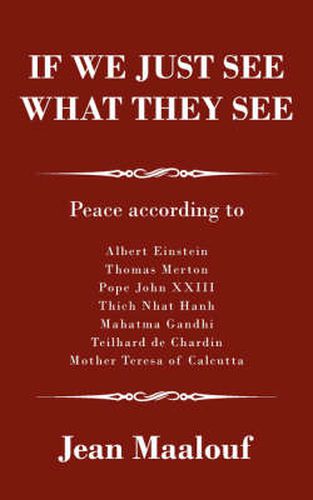Readings Newsletter
Become a Readings Member to make your shopping experience even easier.
Sign in or sign up for free!
You’re not far away from qualifying for FREE standard shipping within Australia
You’ve qualified for FREE standard shipping within Australia
The cart is loading…






This title is printed to order. This book may have been self-published. If so, we cannot guarantee the quality of the content. In the main most books will have gone through the editing process however some may not. We therefore suggest that you be aware of this before ordering this book. If in doubt check either the author or publisher’s details as we are unable to accept any returns unless they are faulty. Please contact us if you have any questions.
Why do we keep talking about peace, and never seem to have peace? Why does violence tend to captivate our attention more than peace does? What is the real cause of violence? Who/what/where is our “enemy”? Why do we fight the symptoms instead of the malady? Are there new ways of thinking and living that lead to a new world order and a brighter future? To such questions and to many more, this book has answers. They are the challenging answers of Albert Einstein, Thomas Merton, Pope John XXIII, Thick Nhat Hanh, Mahatma Gandhi, Teilhard de Chardin, and Mother Teresa of Calcutta. These well-known and highly respected masters convey to us a message of higher consciousness that puts all our issues-political, social, psychological, philosophical, and theological-in the light of the fullness of life and truth. They point, in one way or another, to the one and same essence of what makes us all truly human. The seven semi-scholarly essays of this book are gathered under one title: If We Just See What They Saw. Each essay directly connects the reader to these visionary architects of human development-one at a time. This profound interaction with them will allow readers to insightfully choose a better way of thinking and living in the context of our today’s changing world. There should be another way. Otherwise, “If [we] do not change direction,” as a Chinese proverb says, “[we] are most likely to end up where [we] are going”-to self-destruction. This book is not just another book on peace, and has nothing to do with any one particular war or any one particular aspect of violence-any aspect of violence is a symptom not the malady. The real battlefield is not in the symptoms, but as Teilhard de Chardin saw it, “in man’s mind and soul.” And this is where the real battle takes place initially, and this is where it should end. Aiming at reaching the objective scholarly truth by transcending ideologies, political parties, nations, religious beliefs, circumstances, places, times, and
$9.00 standard shipping within Australia
FREE standard shipping within Australia for orders over $100.00
Express & International shipping calculated at checkout
This title is printed to order. This book may have been self-published. If so, we cannot guarantee the quality of the content. In the main most books will have gone through the editing process however some may not. We therefore suggest that you be aware of this before ordering this book. If in doubt check either the author or publisher’s details as we are unable to accept any returns unless they are faulty. Please contact us if you have any questions.
Why do we keep talking about peace, and never seem to have peace? Why does violence tend to captivate our attention more than peace does? What is the real cause of violence? Who/what/where is our “enemy”? Why do we fight the symptoms instead of the malady? Are there new ways of thinking and living that lead to a new world order and a brighter future? To such questions and to many more, this book has answers. They are the challenging answers of Albert Einstein, Thomas Merton, Pope John XXIII, Thick Nhat Hanh, Mahatma Gandhi, Teilhard de Chardin, and Mother Teresa of Calcutta. These well-known and highly respected masters convey to us a message of higher consciousness that puts all our issues-political, social, psychological, philosophical, and theological-in the light of the fullness of life and truth. They point, in one way or another, to the one and same essence of what makes us all truly human. The seven semi-scholarly essays of this book are gathered under one title: If We Just See What They Saw. Each essay directly connects the reader to these visionary architects of human development-one at a time. This profound interaction with them will allow readers to insightfully choose a better way of thinking and living in the context of our today’s changing world. There should be another way. Otherwise, “If [we] do not change direction,” as a Chinese proverb says, “[we] are most likely to end up where [we] are going”-to self-destruction. This book is not just another book on peace, and has nothing to do with any one particular war or any one particular aspect of violence-any aspect of violence is a symptom not the malady. The real battlefield is not in the symptoms, but as Teilhard de Chardin saw it, “in man’s mind and soul.” And this is where the real battle takes place initially, and this is where it should end. Aiming at reaching the objective scholarly truth by transcending ideologies, political parties, nations, religious beliefs, circumstances, places, times, and